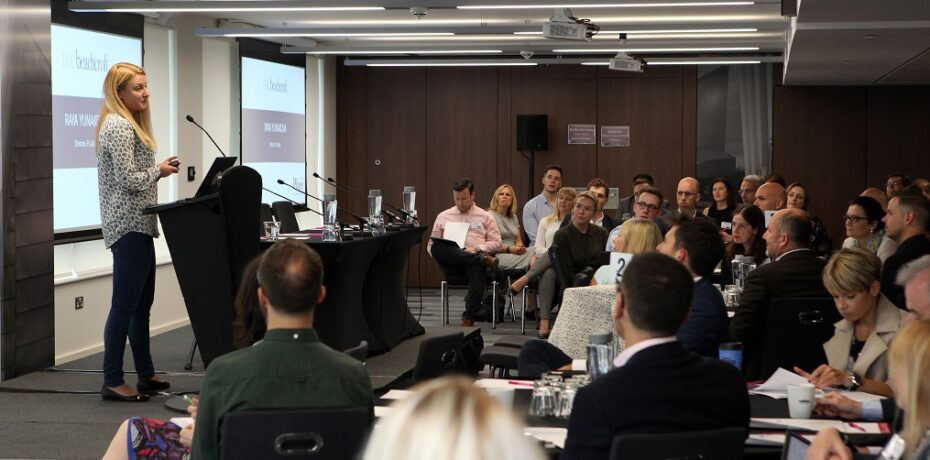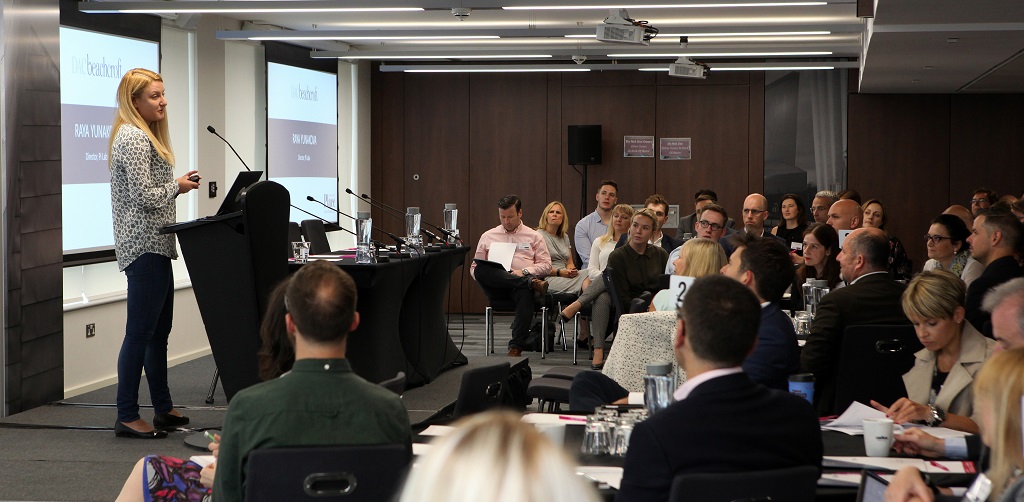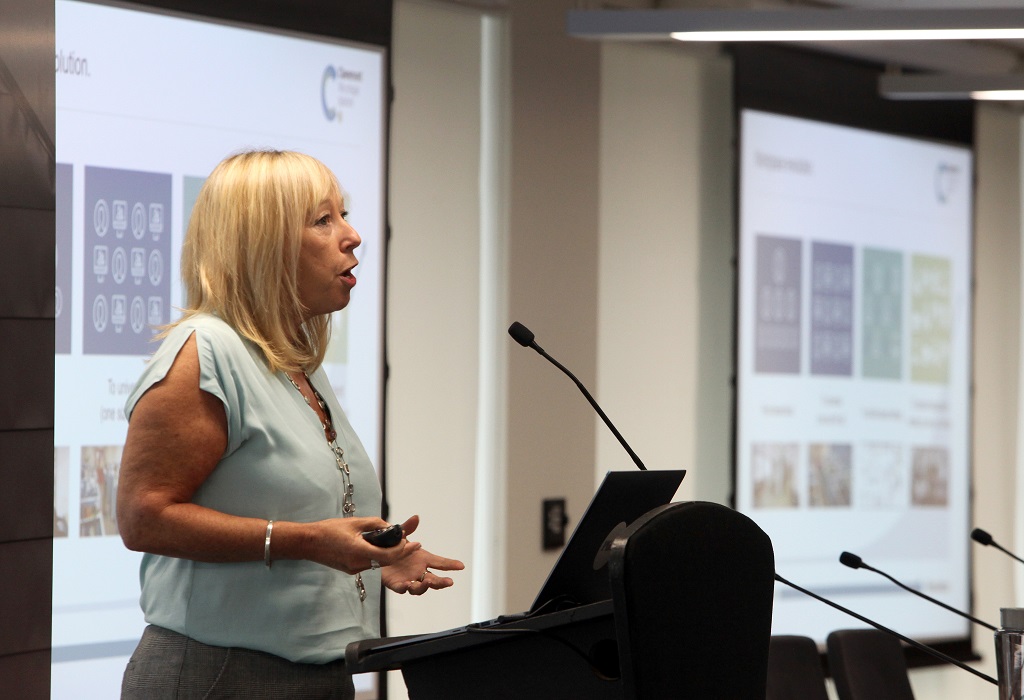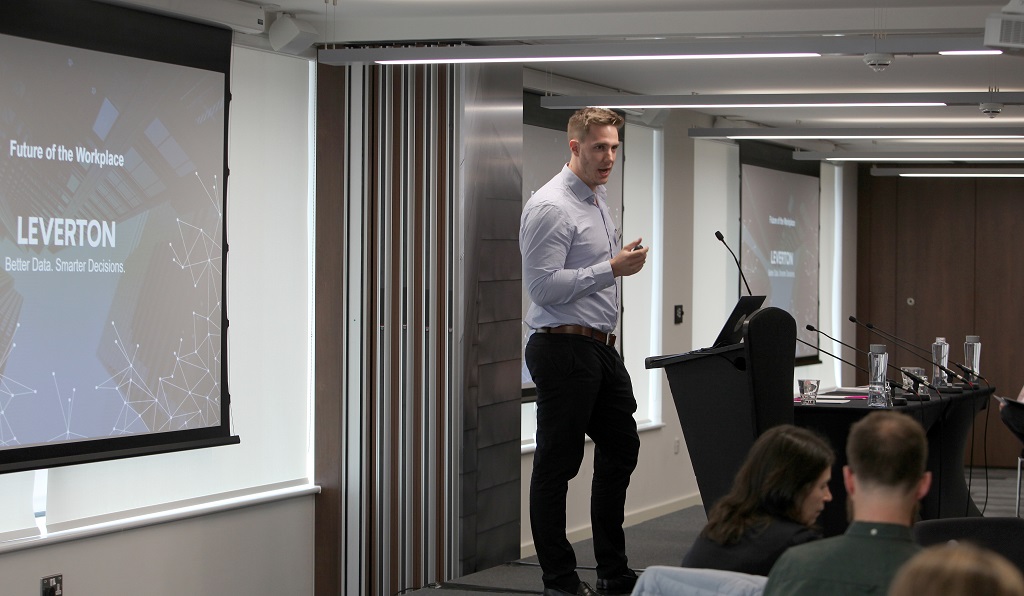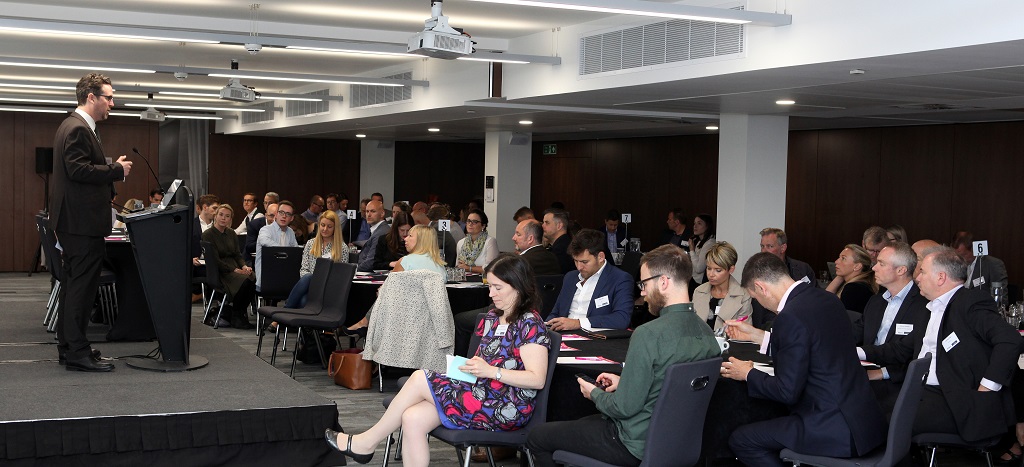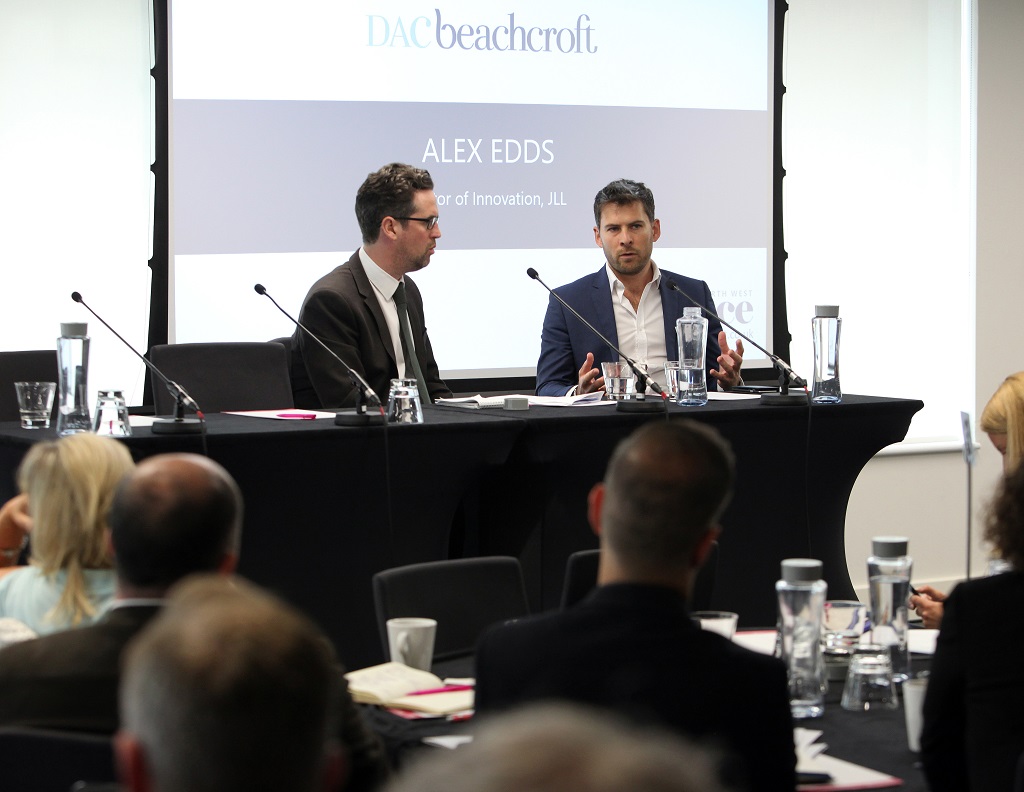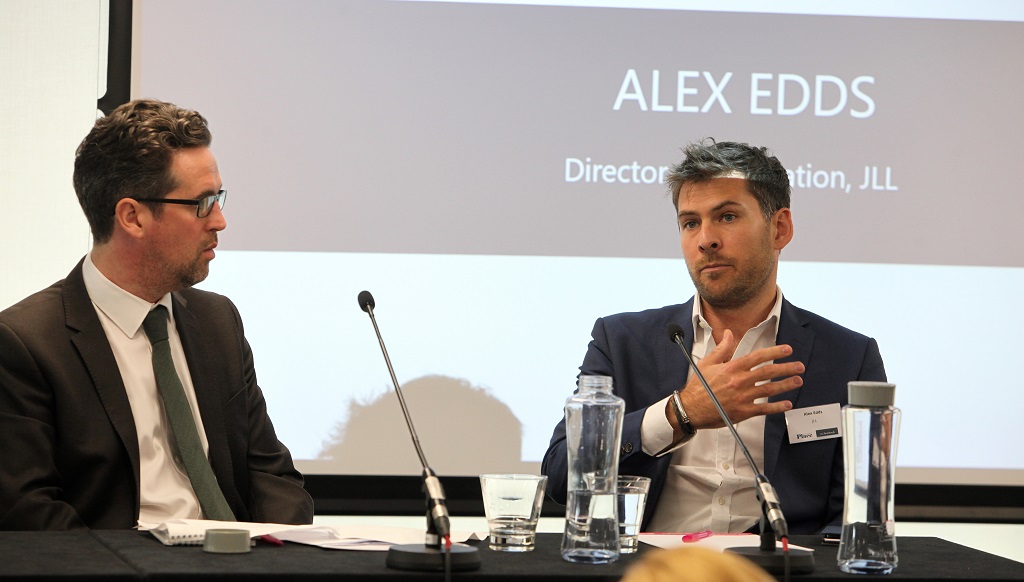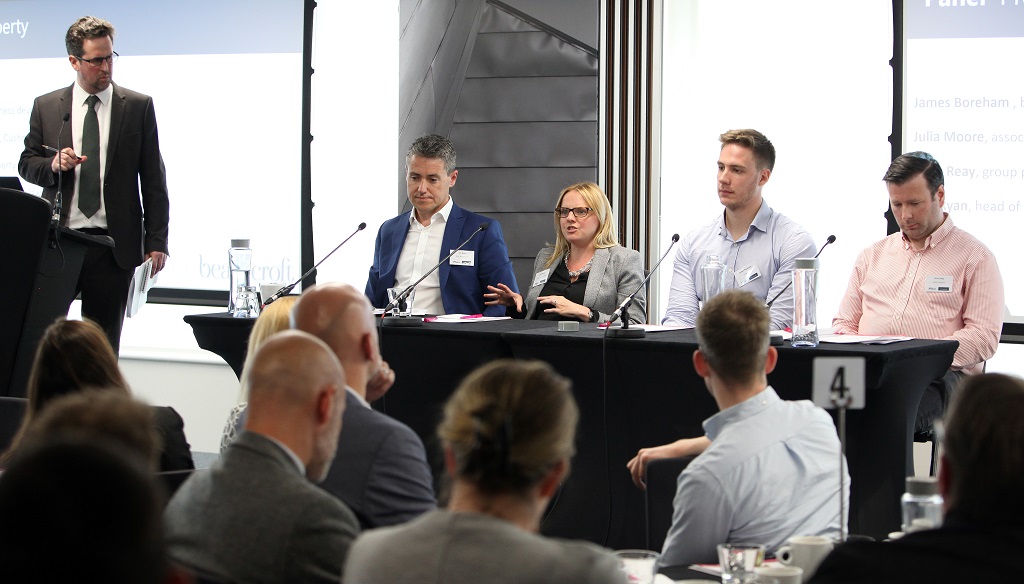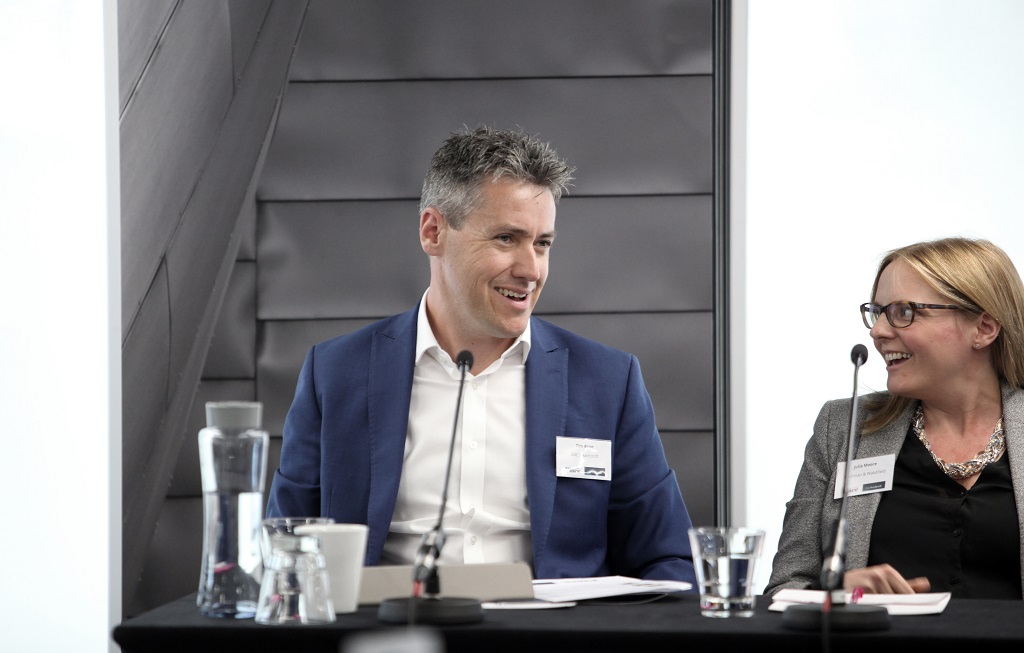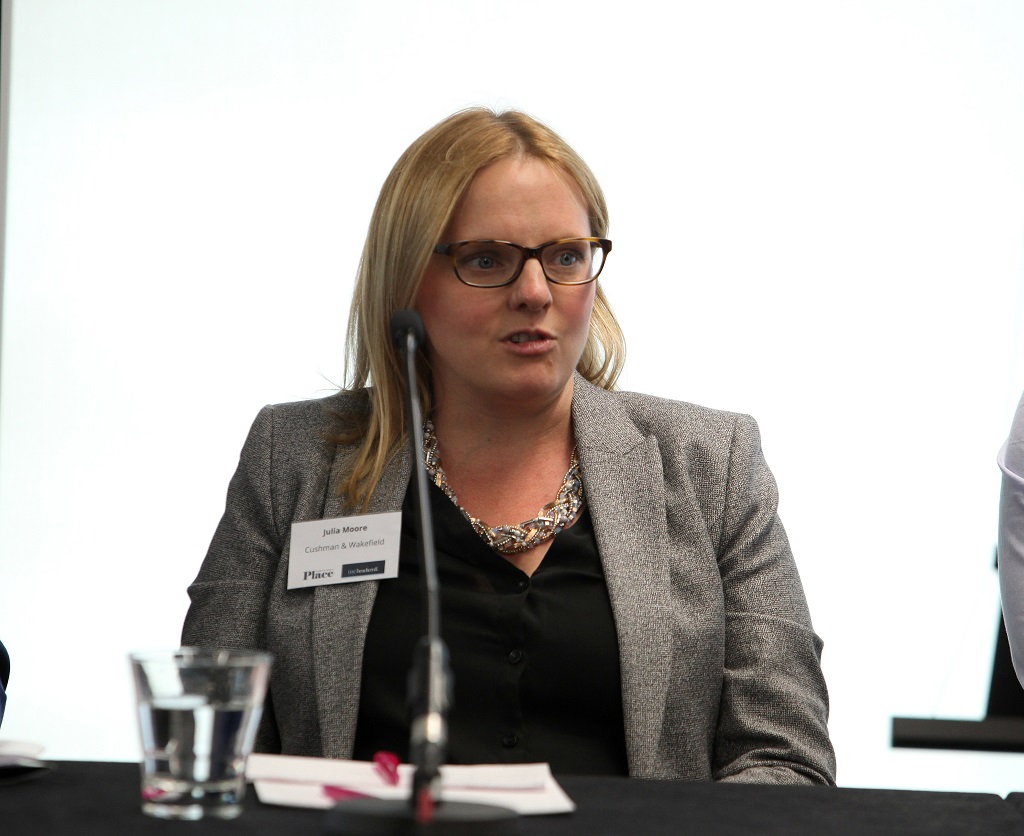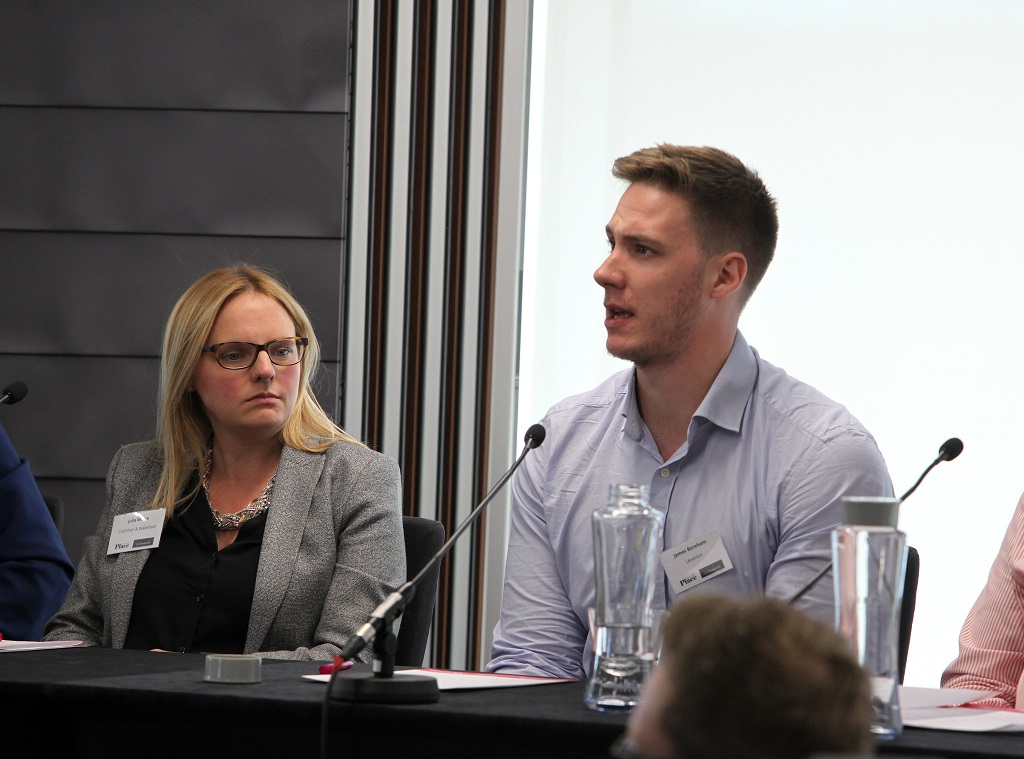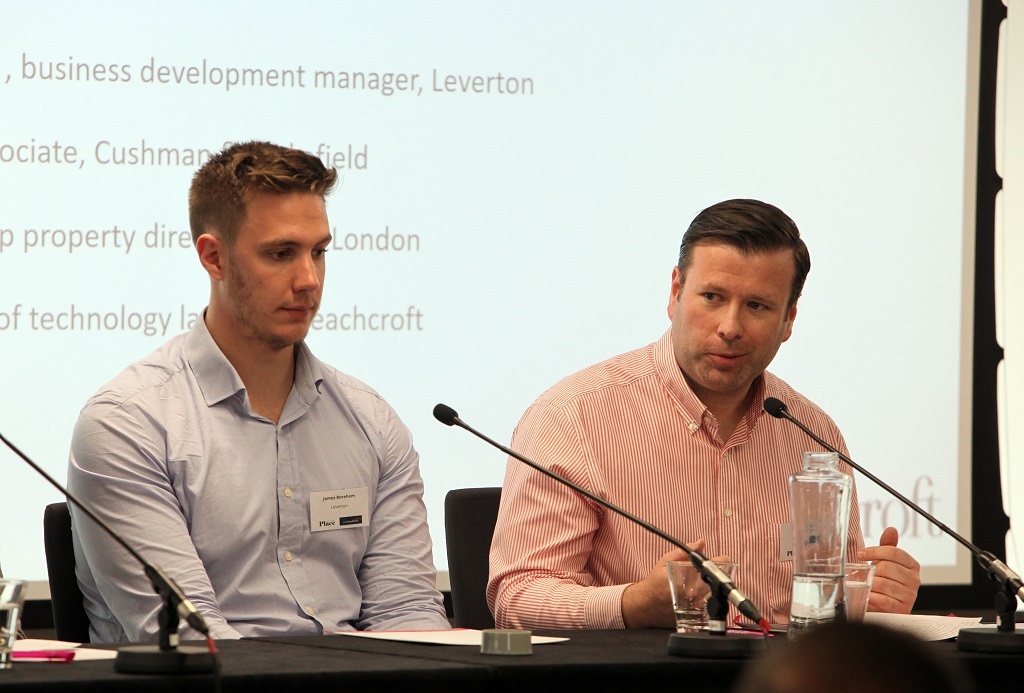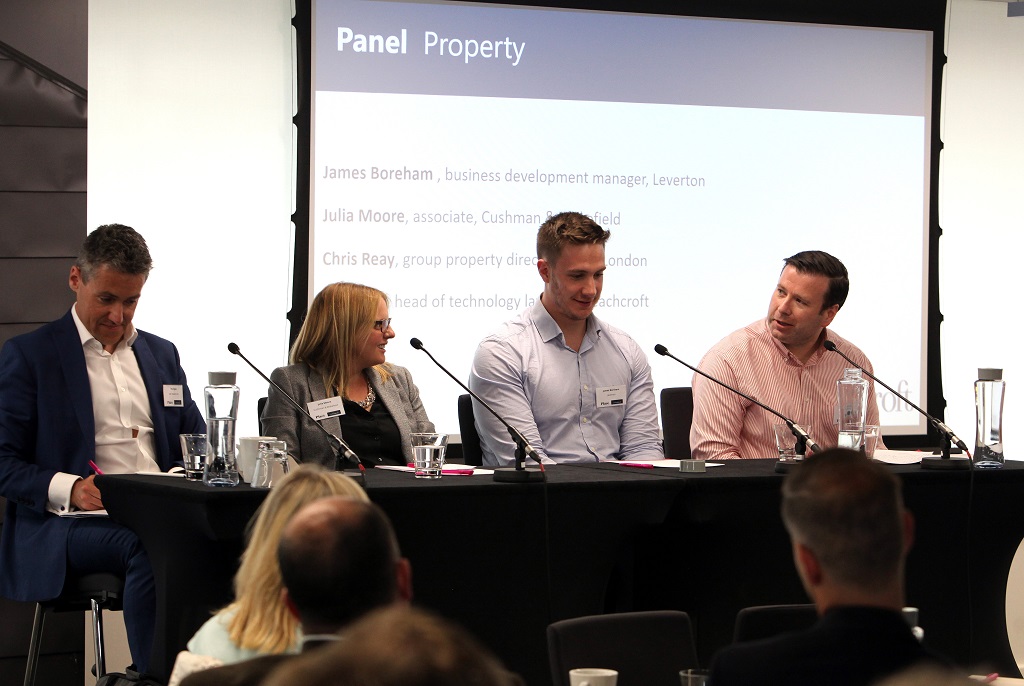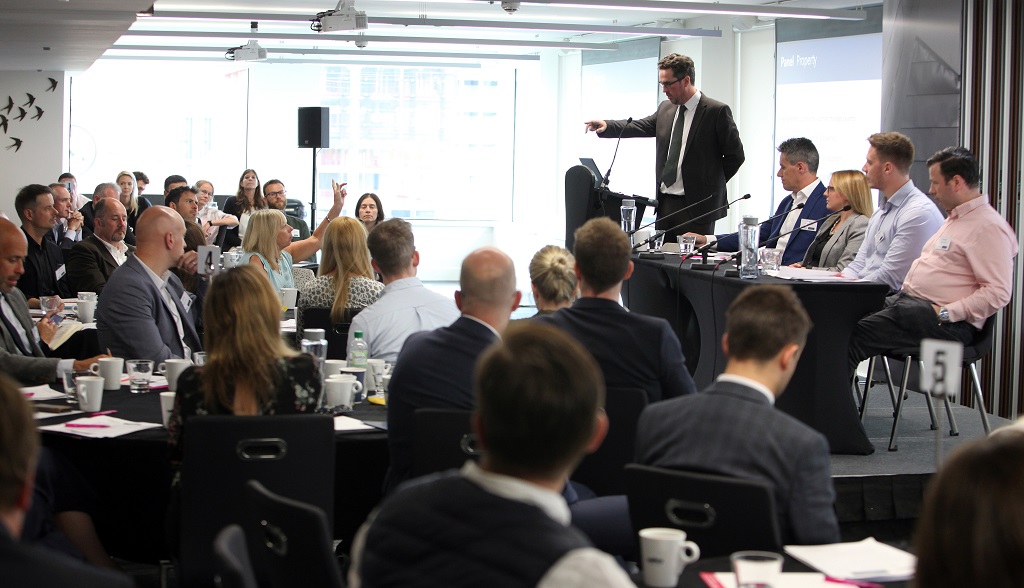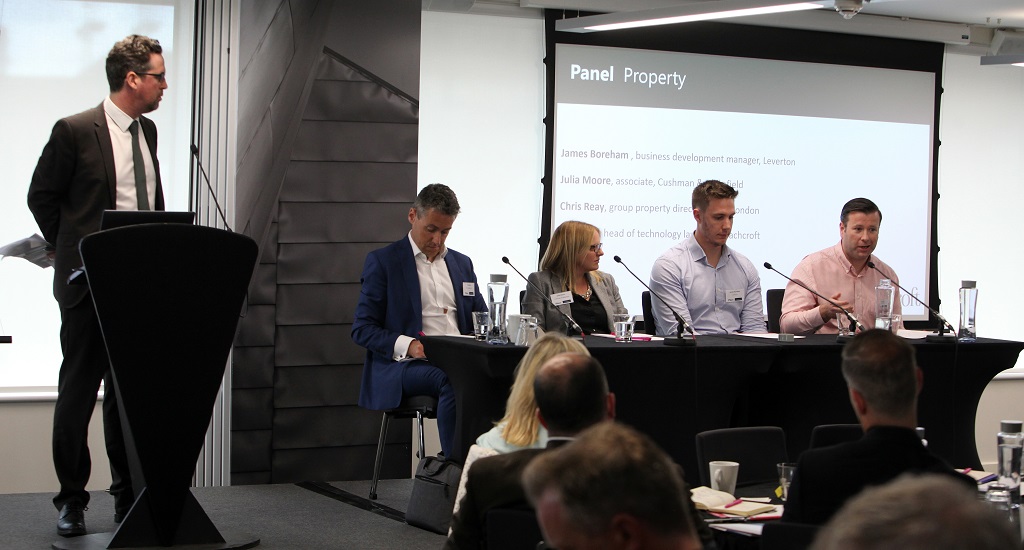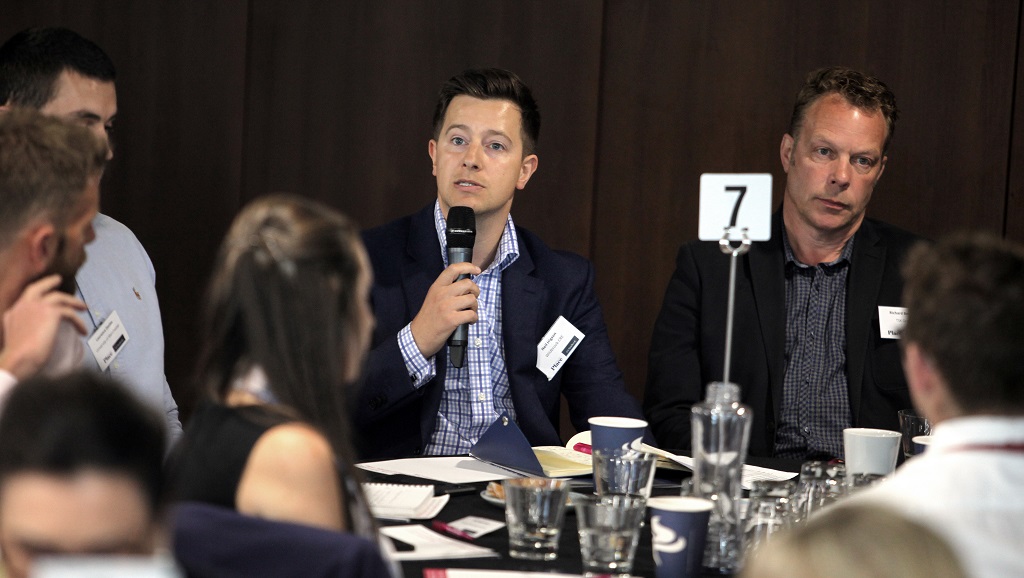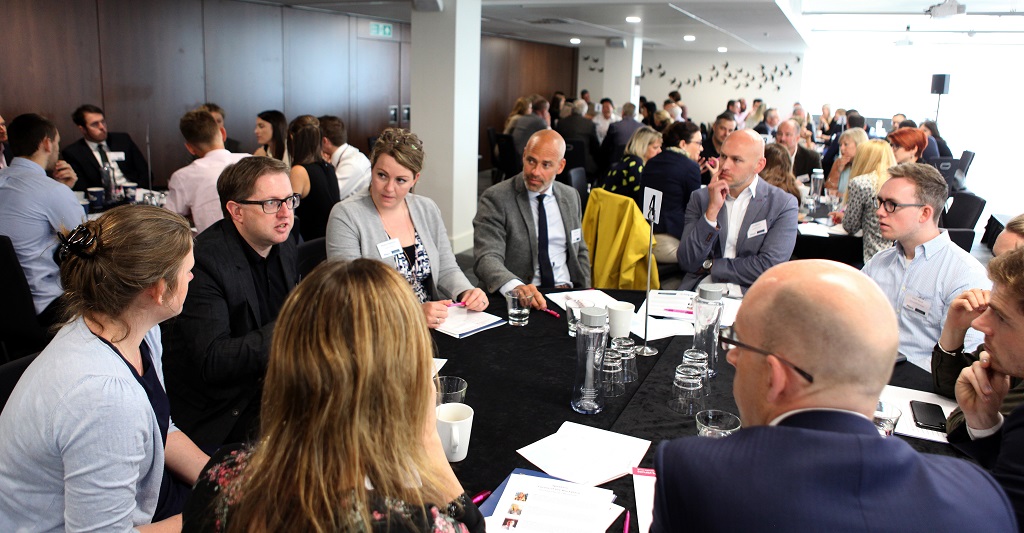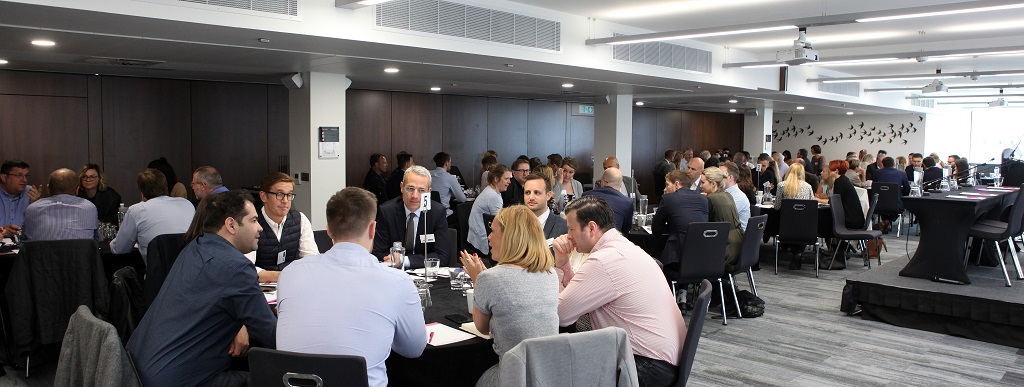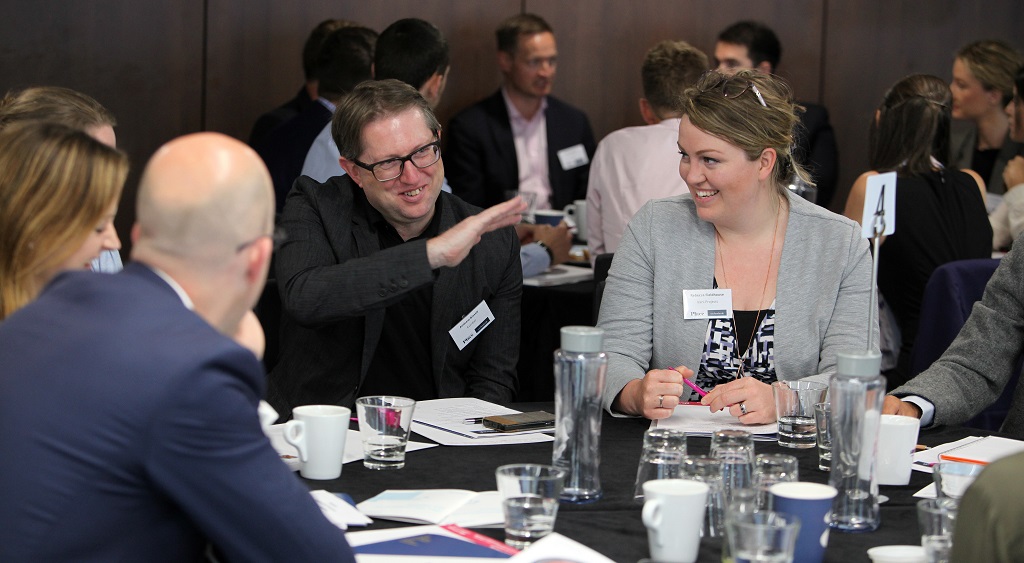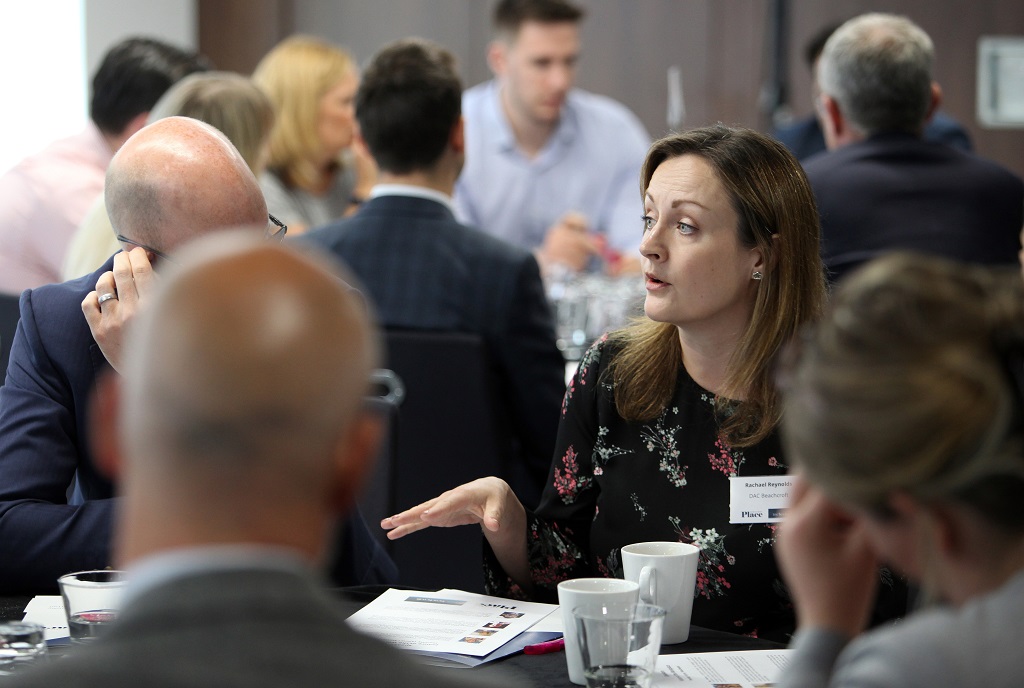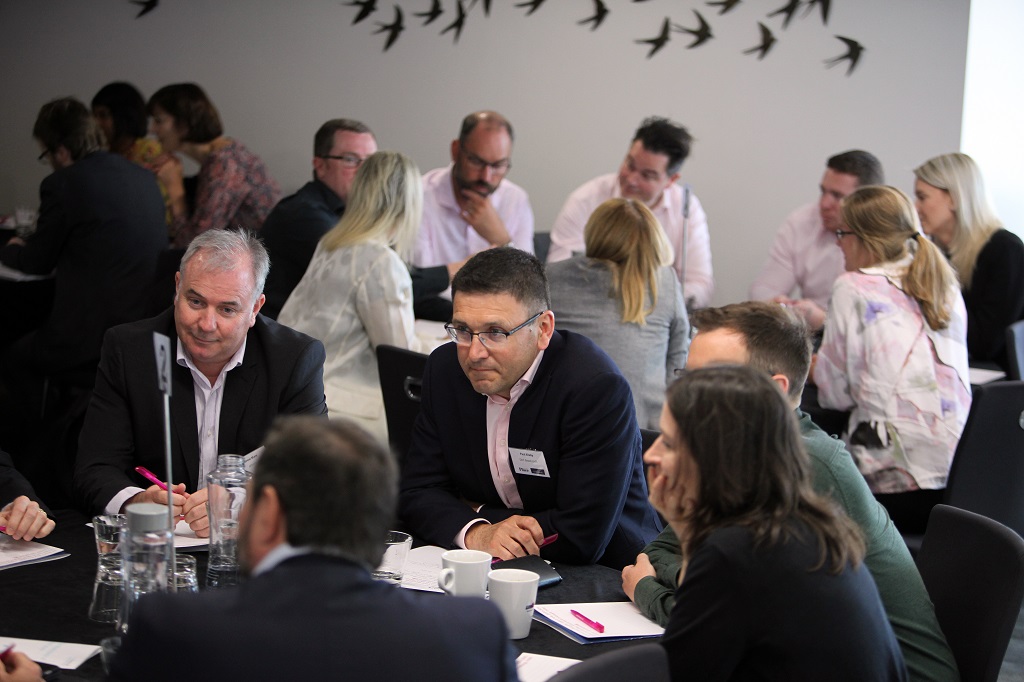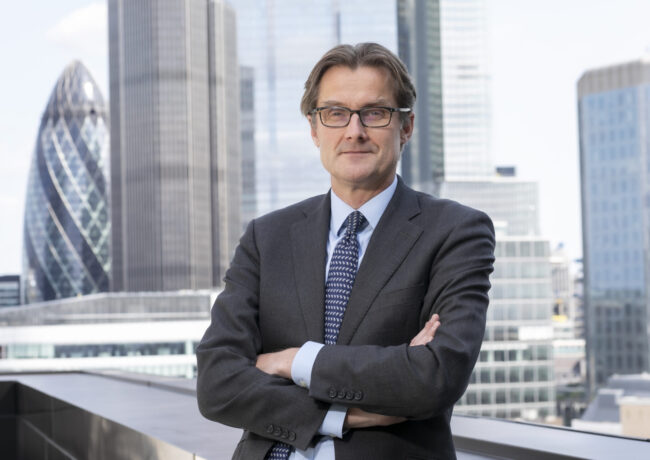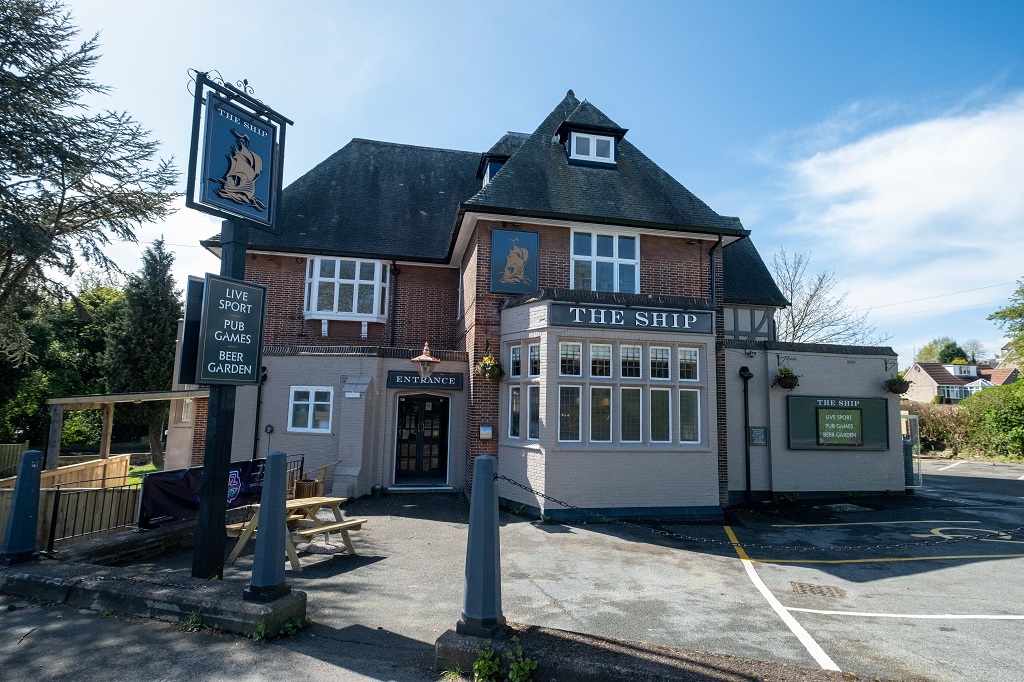Event Summary
DAC Beachcroft: Future of the Workplace | Summary, slides + photos
The Future of the Workplace, hosted by DAC Beachcroft and Place North West, explored issues facing developers and businesses as they attempt to futureproof their offices in a fast-moving technological age.
See below for gallery + slides
Speakers included Alex Edds, director of innovation at JLL, strategic advisor to Liquid Real Estate Innovation, and a leading figure in the proptech movement; Raya Yunakova, programme director at Pi Labs, who provide venture capital and business support to high growth potential proptech firms; James Boreham, business development manager at Leverton, AI for real estate; Chris Reay, group property director at Allied London, developer of XYZ Building and No1 Spinningfields, and now focused on St John’s and Enterprise City; Ann Clarke, joint managing director at Claremont Group, a fit-out design and delivery firm shaping spaces for office occupiers; Julie Moore, global account and transactions manager at Cushman & Wakefield, part of the team that has advised Facebook, Ericsson, Microsoft and Amex Foster Wheeler on office needs; and Tim Ryan, head of technology law at DAC Beachcroft.
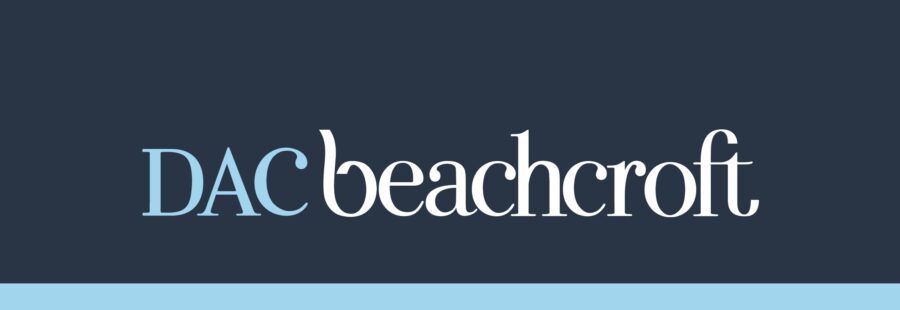
Paul Unger, publisher of Place North West and sister publication PlaceTech, chaired the event and opened the session by calling the future of the workplace “one of the most fascinating areas of commercial property at the moment” but yet “our phones are smarter than the buildings we work in, and technology is more advanced in our homes than our offices.”
What’s happening in workplace innovation
Unger’s welcome was followed by an investor’s insight from Raya Yunakova at Pi Labs:
- Yunakova commented on the fear many hold when it comes to the rise of technology. “We keep wondering when technology is going to take our jobs away, when it’s going to make us redundant. It’s not – it’s only going to take away the really manual, boring parts of our jobs”
- Citing what’s causing change in the workplace, Yunakova explained: “We don’t like to think of work as a 9 to 5 anymore – that’s no longer the case. We spend an awful amount of our lives at the workplace and because we spend so much time there we don’t want to be at a place where we are unhappy. So there’s been a shift in what we look for in a workplace. Your environment affects your productivity so much. Just having a view of the outside world can increase productivity by 6.5%”
- As a result, Pi Labs has invested in two companies which focus on smart buildings. One provides energy efficient facades which use sensors and software to measure temperature and light, and track individuals’ body temperature anonymously, so each person can feel comfortable in the building. The other, a community management system for occupancy insights, allows people in the building to communicate with each other and to use the building to its best efficiency
- Yunakova highlighted that “the most fundamental shift [to the workplace] is cloud and mobile, which has made it possible to work any time, from any place”
- Pi Labs is most excited about seeing how the workplace is affected by the next big technological change, AI. The company believes AI is driving change both in the way we perform tasks, as well as helping us find homes better suited to us which will affect our jobs and what kind of jobs we’ll do
- Yunakova also saw the workplace being affected by the rise of self-driving cars. She asked: “What does the future workplace look like? Is it a place or is it a vehicle that’s moving elsewhere?”
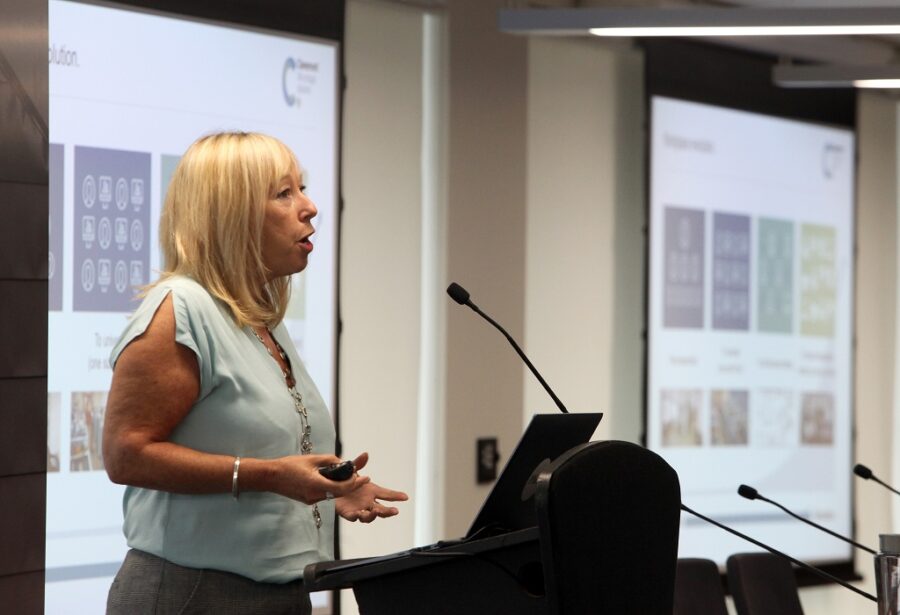
Ann Clarke, joint managing director of Claremont Group
Changing face of office design
Following on from Yunakova, Ann Clarke, joint managing director at Claremont Group Interiors, presented on how office design is developing due to the change in workforce values.
- “Any workplace change shouldn’t feel like it’s being done to you, but instead you feel involved. There’s a difference in behaviors for generations and we need to supply for all of them,” she said
- About 70% of UK organisations are now participating in flexible working, however, there’s still a sense of “If you’re not at your desk and I can’t see you doing that work, how do I know you’re doing it?” Clarke explained that there needs to be an element of trust
- Clarke argued companies that shift to flexibility will have the pick of the best staff due to an aging population with more caring responsibilities, as well as people being mothers and in single parent families
- Space in offices used to be based around status, but it’s gone from hierarchical to “one size fits all”. Clarke added that a one size fits all office is inappropriate if companies want to give employees the right tools for the job. The workplace needs to become “activity-based. Instead of having ‘my’ space, it’s ‘our’ space or ‘any’ space”
- Clarke highlighted that the next big trend is wellness, and that one of the biggest issues in that is the many hours spent sitting. She questioned: “Is sitting becoming the new smoking?” It’s in both employers and employees’ interests to have flexibility and movement from a health perspective. People who have sitting jobs have twice the chance of developing cardiovascular issues than people with standing jobs
- Technology that Clarke said would cause great changes in the workplaces are IoT, AI and augmented reality. For example, printers that know they’re about to run out, air and lighting on a personal basis, and how augmented reality can transform meetings
- Clarke predicted the future facing the workplace. “People will have much higher expectations of the workplace, they want it to be a hub. You’ve also got to give them the tools that they need no matter where they are whilst also having inclusivity – we need to humanise the workplace or people will feel alienated. We’ve also got to move away from judging how many hours people work to what they’re bringing to the job”
First roundtable: NOW
After Yunakova’s and Clarke’s presentations gave plenty of food for thought, attendees were encouraged to breakaway to their tables to discuss what they are seeing now in the workplace, and how they’re preparing for the future.
- One of the points from one table was that in terms of technological innovations, companies are not getting far yet. They’re still in the process of breaking down the literal walls in the office and many are terrified of the change from going agile. The main innovation needs to be cultural
- On another, they discovered most people were working within quite flexible working operations and most had the ability to work from home. A few were in co-working environments, but the behaviours from those showed that they hadn’t fully adapted to the technological and physical changes in the offices. “Sitting is the new smoking” was another stand-out point raised. Only one company on the table of 10 had the ability to sit or stand
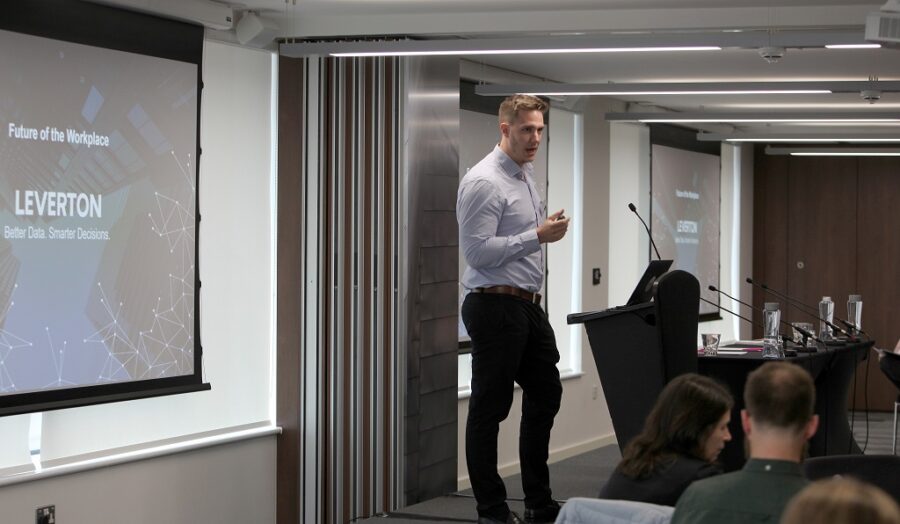
James Boreham, business development manager at Leverton
Changing the nature of work
Next to present was James Boreham, business development manager at Leverton, an AI company for real estate which makes management processes faster and more accurate
- Boreham explained that Leverton’s process involved using machine learning for document extraction. He described it as “a hybrid between a human and a machine” and that “we’re not really at the stage for technology to make commercial decisions yet, they need supervision and tweaks”
- Boreham said there is a trend towards shorter data models with companies only wanting to know key information; corporates are caring more about their lease data, and want to invest in technology which fits within all of their infrastructure; openness to AI is great with more companies than expected willing to trial and adopt; a key idea is that the workplace can be anywhere so companies need to have centralised processes and AI can assist; and clients are wanting more data to make decisions.
- How will the rise of AI impact us? Boreham said that AI can speed up due diligence; mundane tasks will become automated which eliminates current necessary burdens; and early adopters will be rewarded
In conversation with Alex Edds
Unger was joined by Alex Edds, director of innovation at JLL, to discuss offices of the future.
- Replying to the question of “how do I futureproof my building?”, Edds said you have to start by making the building as flexible as possible, and have good internet: “It’s going to potentially have mass technologies which will need that infrastructure.” Occupiers are wanting to close the gap between signing the lease and getting that technology in place before they set up camp
- According to Edds, WeWork will be the largest occupier in London by the end of the year: “It presents the question to the industry of, do I go into that space? Some investors will be seeing co-working as an opportunity for a new business model, whereas others will just invest in it as a third party”
- Edds questioned whether the mass of data being collected from occupiers was being used to its full potential from a facilities management point of view: “Effectively by equipping buildings, we’re creating more data. At the moment that data is all over the place, but we’ve got some big technology companies coming into this space. The question is, do you equip the building or do you plug-n-play? I’ve seen some of the smartest buildings still struggle with how people are using it. It’s an area that will see huge amounts of consolidation, and there needs to be a more rigorous approach to how we’re using this tech”
- Is there an Elon Musk for real estate? Edds didn’t think so: “WeWork is the poster child for creating new business models but a bit more of a pioneering spirit is needed. It doesn’t matter how good the tech is, people won’t use it if they don’t know why they’re using it”
- Where should property professionals begin their digital transformation? Even mentioning AI and blockchain is enough to scare some. Many believe that if everybody is talking about it, everybody must be doing it, which Edds said it isn’t true. “If you take one step forward, which can be relatively small, the second step you take will be much larger than the first. Make easy wins sooner, getting on this journey doesn’t have to be a huge step”
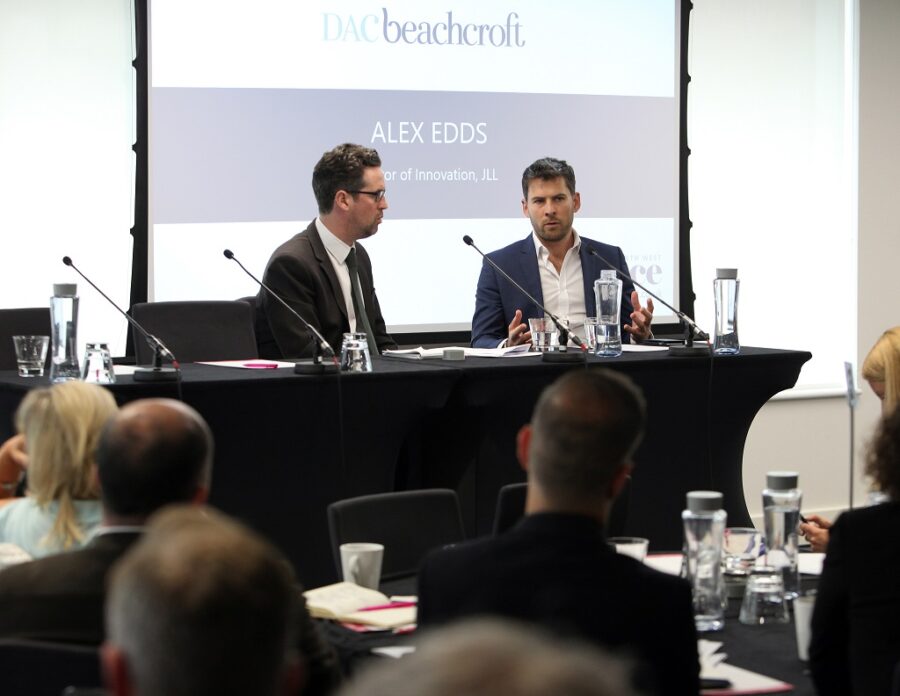
Unger, left, in conversation with Alex Edds of JLL
Panel
The conversation with Edds was followed by a panel discussion chaired by Unger, where he was joined by James Boreham alongside new additions; Julie Moore, global account and transaction manager at Cushman & Wakefield; Chris Reay, group property director at Allied London; Tim Ryan, head of technology law at DAC Beachcroft.
- Boreham reported that clients were more open minded about AI. Even when meeting senior partners, with 30-40 years’ experience in the property, they’re still open-minded as they’ve seen how technology has changed and how it can improve how they operate
- Reay explained that at Allied London, the tendency towards CAT A office fit-outs is being eroded with more tenants wanting a shell so that it gives them total flexibility with what they do with the space. He added: “It makes it difficult for us to bring properties to market because in shell condition it’s difficult for many to imagine the end result. VR makes it easier by showing what it could look like”
- Regarding the rise of WeWork, Reay said: “They are changing the market. Corporates are bypassing the traditional office world to instead go to WeWork. It’s so simple and there’s nearly no set-up contract, there’s access to a community, and they can rub shoulders with the small tech innovation guys – it’s no surprise why there’s been a meteoric rise to co-working”
- Ryan raised an issue concerning co-working; physical and cyber security. Often when people imagine a threat to their cyber security, they imagine a hacker in another country, whereas it’s more likely and easier for somebody to sit at your desk with a USB stick and plug it in
- Moore added to the general feeling that WeWork is here to stay: “Everybody who works there seems to be younger than me and I’m 33. I want to be cynical but every time I visit one I always come away and think it would be cool to work in a WeWork. The WeWork team are very good at selling communities and the why factor rather than the building – which people are craving more and more of”
- Moore pointed out that “we are an aging population, there’s going to have to be a shift away from ‘how do we appeal to the young and trendy?’, to ‘how do we make our buildings accessible to everyone?’”
- Ryan highlighted how trendy coworking spaces were changing the perception of offices – some in London wouldn’t allow people in wearing suits, which creates a private club feel but also leads to the inevitable creation of niche communities. However, the supposed target audience, Millennials, were still keen on practicality: “They want somewhere pretty sensible to work, no one’s sitting on bean bags all day”
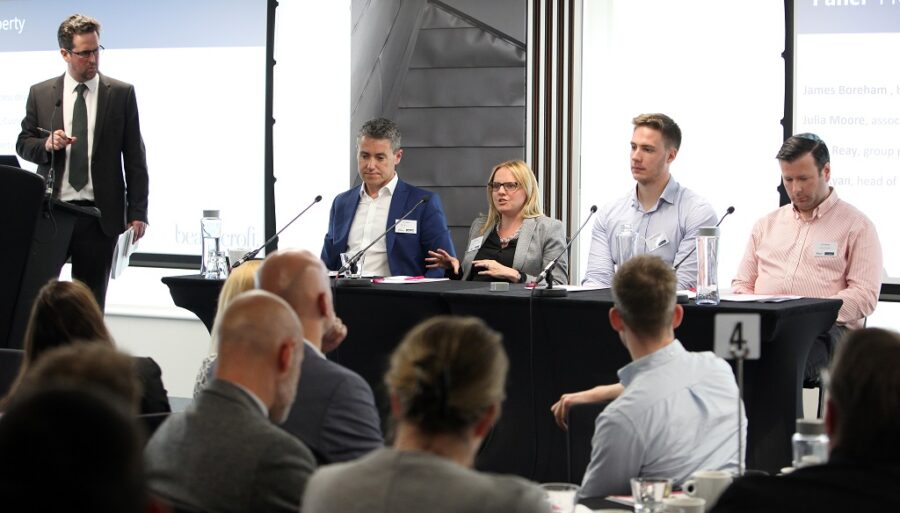
Panel discussion, from left: Unger, Tim Ryan of DAC Beachcroft, Julie Moore of Cushman & Wakefield, James Boreham of Leverton, Chris Reay of Allied London
Questions & response to panel
- The panel attested that outdoor space was becoming increasingly important in office developments, with Reay stressing “Manchester is hungry for rooftop dining”, and Boreham pointing out that Aberdeen Asset Management had recently left 20% in a building for open and shared space as it would be a good investment in terms of tenant retention
Second roundtable: FUTURE
After the panel and to end the event, attendees were again asked to discuss on their tables to discuss how they are preparing for future innovation and their concerns.
- Making a plea to connectivity providers was on the agenda for many, and for developers to start conversations about it at the beginning, as you would with providing water
- There were concerns as to how companies can marry flexibility with creating a work community – if you’ve got a half empty office, how do you build one?
Visit Place North West’s Slideshare to view the presentations given on the morning
Click any image below to launch gallery
- Raya Yunakova of Pi Labs opens the conference
- Ann Clarke, joint managing director of Claremont Group
- James Boreham, business development manager at Leverton
- Paul Unger, publisher of Place North West and PlaceTech, addresses the audience
- Unger, left, in conversation with Alex Edds of JLL
- Unger, left, and Edds
- Panel discussion, from left: Unger, Tim Ryan of DAC Beachcroft, Julie Moore of Cushman & Wakefield, James Boreham of Leverton, Chris Reay of Allied London
- Tim Ryan, head of technology law at DAC Beachcroft
- Julie Moore, account and transactions manager at Cushman & Wakefield
- Boreham of Leverton speaks on AI
- Reay of Spinningfields and St John's developer Allied London
- From left: Ryan, Moore, Boreham and Reay
- Place publisher Paul Unger takes questions from the floor
- From left: Unger, Ryan, Moore, Boreham and Reay
- Moderators from each table gave points from discussions
- Event consisted of presentations and break-out discussions


